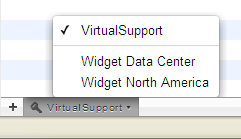Accounts
A Xurrent account is created for an organization when it decides to start using the Xurrent service. The organization’s records are all stored within this account. Access to these records is initially limited to people of the account.
Whenever the need arises, the organization may decide to establish Account Trust relations with other Xurrent accounts. This allows service level agreements and first line support agreements to be established between these accounts. In addition, a trust relation makes it possible for an account administrator to make one or more of the account’s roles available to a trusted account.
Some organizations have multiple accounts. One account may be used by its data center and its other accounts may be used by the different affiliates in different countries or regions. The data center and the IT departments of the different affiliates can be completely autonomous when each uses its own account. They can restrict access to their data as much as desired and can still collaborate seamlessly with the other parts of the organization. Separating the data of the data center and the different IT departments into different accounts has the added benefit that each organizational entity is able to configure its account as it sees fit, without affecting the configuration of the accounts of the other organizational entities.
As a rule of thumb, an organization should consider creating a separate account for each of its IT departments.
Account Switcher

When a user has roles of different accounts and is therefore allowed to see records of these different accounts, this user will be able to switch to another account by clicking on the account switcher below the view. The account switcher is set by default to the account to which the Person record of the user belongs. If a user has access to more than one account, the name of the account displayed in the account switcher is followed by a small triangle.
Directory Accounts and Support Domain Accounts
When the Xurrent service is used by multiple support domains of the same organization (e.g. by the Information Technology department, the Human Resources department and the Facilities Management department), then this organization typically will have set up a directory account. A directory account is used to register all Organization, Person and Site records of the entire organization. When a directory account is used, each of the organization’s support domains is given its own Xurrent account. These support domain accounts are linked to the directory account. The links give the support domain accounts access to all Organization, Person and Site records of the directory account.
The advantages that a directory account provides are primarily:
- All employees of the organization have online access to the support domains that provide services to them from a single self-service portal.
- Each request gets registered in the support domain account for which it was submitted. This ensures that access to these requests is restricted to people with a role of the support domain account.
Strong Privacy
In an account for which the ‘Strong privacy’ option is enabled, access of the account’s specialists is restricted to requests, problems, tasks, and project tasks that are assigned to their team. An approver for an approval task has visibility of the entire workflow. A person with the Project Manager role can see only those projects that person is the manager of. People who are mentioned in a project task have visibility of the entire project.
When a request with an internal note of a strong-privacy account is assigned to another account that has ‘Strong privacy’ disabled, then all specialists of that account can see the request, but they are not able to see the internal note, even if that account has the same directory account as the strong-privacy account.
End User Privacy
Users related to an account for which the ‘End user privacy’ option is enabled cannot have roles. End user-privacy accounts are limited to end users. Typically, end user-privacy accounts are used for governmental, retail, and educational organizations to register citizens, consumers, and students. These people cannot mention others or be mentioned. They can also not register requests on behalf of others, nor can requests be registered on behalf of them. They cannot be key contacts or customer representatives. In no way is a person from an end user-privacy account able to see another person from that account or descendants.